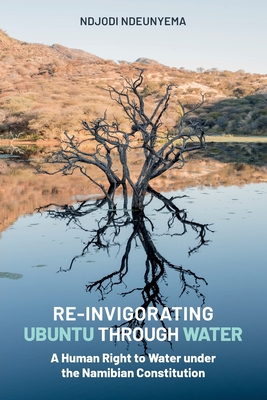Re-Invigorating Ubuntu Through Water: A Human Right to Water under the Namibian Constitution

Re-Invigorating Ubuntu Through Water: A Human Right to Water under the Namibian Constitution
This book argues for the existence of a court enforceable human right to water that is implied from the right to life in Article 6 of the Namibian Constitution.
The book builds this argument by using tools of constitutional interpretation and with the aid of comparative materials. As such, the African value of ubuntu is invoked. Ubuntu - which is legally developed through its four key principles of community, interdependence, dignity and solidarity - is anchored in a novel approach to Namibian constitutional interpretation that is conceptualised as 're-invigorative constitutionalism'. The book advances the 'AQuA' (adequacy - quality - accessibility) content of water and articulates the correlative duties within the context of the respect - protect - fulfil trilogy, which are duties imposed upon the Namibian state as the primary duty bearer for a right to water. These duties include irreducible essential content duties that are argued to be immediate when compared to general obligations. In giving substance to duties that flow from a right to water, international law interpretative resources are also relied upon, including General Comment No 15 by the United Nations Committee on Social, Economic and Cultural Rights, the African Commission's Principles and Guidelines on Social and Economic Rights, and the World Health Organisation's Drinking-water Quality Guidelines. Moreover, the book addresses various justiciability concerns that may arise, arguing that Namibian courts are institutionally competent and legitimate in enforcing right to water claims through the application of the bounded deliberation model. Additionally, because the Principles of State Policy in Article 95 of the Namibian Constitution are rendered court unenforceable by Article 101, the argument is made that this does not undermine the claim that a right to water, anchored in the right to life, can be enforced through the courts.
- Dr Ndjodi Ndeunyema
Modern Law Review Early Career Research Fellow, University of Oxford.
PRP: 330.58 Lei
Acesta este Prețul Recomandat de Producător. Prețul de vânzare al produsului este afișat mai jos.
297.52Lei
297.52Lei
330.58 LeiLivrare in 2-4 saptamani
Descrierea produsului
This book argues for the existence of a court enforceable human right to water that is implied from the right to life in Article 6 of the Namibian Constitution.
The book builds this argument by using tools of constitutional interpretation and with the aid of comparative materials. As such, the African value of ubuntu is invoked. Ubuntu - which is legally developed through its four key principles of community, interdependence, dignity and solidarity - is anchored in a novel approach to Namibian constitutional interpretation that is conceptualised as 're-invigorative constitutionalism'. The book advances the 'AQuA' (adequacy - quality - accessibility) content of water and articulates the correlative duties within the context of the respect - protect - fulfil trilogy, which are duties imposed upon the Namibian state as the primary duty bearer for a right to water. These duties include irreducible essential content duties that are argued to be immediate when compared to general obligations. In giving substance to duties that flow from a right to water, international law interpretative resources are also relied upon, including General Comment No 15 by the United Nations Committee on Social, Economic and Cultural Rights, the African Commission's Principles and Guidelines on Social and Economic Rights, and the World Health Organisation's Drinking-water Quality Guidelines. Moreover, the book addresses various justiciability concerns that may arise, arguing that Namibian courts are institutionally competent and legitimate in enforcing right to water claims through the application of the bounded deliberation model. Additionally, because the Principles of State Policy in Article 95 of the Namibian Constitution are rendered court unenforceable by Article 101, the argument is made that this does not undermine the claim that a right to water, anchored in the right to life, can be enforced through the courts.
- Dr Ndjodi Ndeunyema
Modern Law Review Early Career Research Fellow, University of Oxford.
Detaliile produsului










